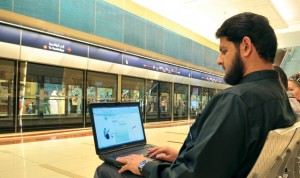By Gareth van Zyl www.arabianbusiness.com
The first deployment of WiMAX in the United Arab Emirates has only recently taken place on the Dubai Metro, whilst the entire Kingdom of Bahrain has had access to this technology for over a year. Gareth van Zyl investigates the growing WiMAX footprint in this region and asks what effects LTE (Long Term Evolution) will have on WiMAX deployment here.

Somebody sitting in the Arabian Desert, pulling out their laptop and accessing the internet thanks to WiMAX is an image that crops up in this writer’s mind when writing about WiMAX in the Middle Eastern countries.
In some areas in the Middle East, such as the UAE, this imaginative scene is still pure fantasy. In other countries here however it’s already a reality. So, what exactly is WiMAX and what are the advantages or disadvantages it offers over fixed line broadband? Also, will LTE spoil WiMAX adaptation in this part of the world?
WiMAX (meaning Worldwide Interoperability for Microwave Access and based on the IEEE 802.16 Broadband Wireless Access standard) is a telecommunications technology that can provide up to 10 Mbps broadband speed.
In the early days of WiMAX it was commonly suggested that signals could reach up to a 48 kilometer range from a base station. Realistically however, the average range for WiMAX signals is likely to be around a 7-8 kilometer radius in what is called Non Line of Sight (NLOS) access, and up to 16 kilometers in Line of Sight (LOS) applications.
Where in the Middle East?
Seeing as WiMAX is regarded as a technology that can help developing nations catch up to developed nations when it comes to broadband access, there has been significant adoption of WiMAX in the Middle East.
There has been much media attention of late on how it has been implemented on the Dubai Metro as a backhaul for WiFi. This particular instance has been the first commercial implementation of WiMAX in the UAE, despite numerous tests being undertaken by Etisalat and Du with regard to WiMAX deployment.
Hatem Bamatraf, Senior Vice President – Network Development, Du, says, “we have designed a WiMAX backhauling network all the way along the track, wherever the metro is moving.
And on the same track we have designed an HSPA network. So, the primary backhauling, the WiFI will talk to the WiMAX and if the WiMAX station is down, it will automatically switch to the HSPA.”
Bamatraf suggests that the UAE has not taken up WiMAX as widely as some of its neighbouring gulf countries have because the UAE already has a good fixed line broadband infrastructure in place. But the likes of Du will consider implementing WiMAX in areas in the country where it is practical to do so.
“If you go to an industrial area … it might be very expensive for you to go and pick the ground or share the existing infrastructure, so, it might be easier and cheaper and faster to go for a wireless network and provide the services. And such technologies like WiMAX would be considered for such a plan,” says Hatem Bamatraf.
Then there are other countries in the Middle East that have rapidly taken up WiMAX. The Kingdom of Bahrain is the first country in the world to have its entire country covered by WiMAX thanks to Menatelecom, a telecommunications provider in the Kingdom of Bahrain.
Saudi Arabia, also has a number of players who have been involved in WiMAX deployment. From Mobily to Go, these operators have broadened that country’s WiMAX footprint significantly over the last decade. Riyadh, in Saudi Arabia, now has full WiMAX coverage thanks to Mobily.
Abdul Aziz Al-Tammami, Chief Operations Officer of Mobily, says, “More than 16 major cities [in Saudi Arabia] are covered with Mobily’s WiMAX network , and we are looking to more than 20 to be covered in the near future. We are working at a rapid pace to put the company well on its way to getting the entire kingdom covered soon, while boosting bandwidth in districts already covered”.



















